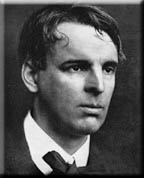
William Butler Yeats
Born 1865  Died
1939
Died
1939
William Butler Yeats was born at Sandymount, Dublin on June 13, 1865 and died on January, 28, 1939, was an Irish poet and dramatist who was considered the leader of the Irish Literary Renaissance during the early 20th century. His early lyrical poems and drama drew breath from Celtic mythology, love, ageing, and mysticism. Yeats once said: “The mystical life is the centre of all that I do and all that I think and all that I write.” His later work became more engaged with his own time period.
It is said that W. B. Yeats was the greatest English-language poet of the 20th century. His mother’s family, the Pollexfens, were known for their eccentricities and interest in astrology and magic. Yeats father was a well know portrait painter who influenced him greatly with his arguments against christian dogma which led Yeats to probe into informal and exotic beliefs. He embraced any teaching which told of supersensual experiences or which helped him understand the visions which came to him. Yeats's poetic career was laced with these mysticisms and visible by his 24th year. He had an attachment to the county of Sligo and would stay there for long periods of time. While living in London (1867-83); his avid interest in the occult led him to found the Dublin Hermetic Society in 1885 and to join the London Lodge of Theosophists in 1887, a famous mystical society. He studied visionary traditions such as Platonic, The Neoplatonic, The Swedenborgian, the alchemical, The Tibetan Mysteries, Buddhism and anything that was visionary and had to do with images. In 1885 he met with the nationalist John O'Leary which prompted his discovery of Ireland as a literary subject and his commitment to the cause of Irish national identity. In 1889 he fell in love with Maud Gonne and published The Wanderings of Oisin.
In 1902, Yeats became the President of the Irish National Theatre Society (later known as the Abbey Theatre) which he wrote plays for. It was Yeats's desire to raise national consciousness by cultural means. Yeats's lifes work was an attempt to "hammer into unity" these evolving areas of his experiences.
In 1903 Maud Gonne married Major John MacBride, the nationalist, leaving Young Yeats very morose and forlorn. Yeats poetic style started to undergo a radical change and encouraged by the friendship of Ezra Pound he broke with his earlier romantic and Pre-Raphaelite type writings. In 1917, Yeats married Georgiana Hyde-Lees who greatly influenced him and gave Yeats material for A Vision, a pursuit in mystical knowledge. Yeats's dual role as poet and public man were confirmed by two events, first the end of the Anglo-Irish war in 1922, and he became a senator of the Irish Free State. In 1923 he received the Nobel Laureate in Literature for "his always inspired poetry, which in a highly artistic form gives expression to the spirit of a whole nation."
Even though Yeats suffered with diseases in his old age, his last 15 years were still enriched with vital energies. True to the principles of a his lifetime, he still did not abandon the attempt to bend the world and himself to his imaginative visions. He continued to look at the world with a joy. Though many times in his life he had suffered and had sadness, his mystical attitude carried him to attain states of ecstasy and euphoria. "There however was one sad event in his ambition and that was his approval during the 1930s of the social and political tenets of fascism. His conception of reality as a struggle between Blakean "contrarieties" of chaos and design, and responsive to his apocalyptic vision of a universal descent into barbarous ruin--prophesied in "The Second Coming," 1920--the flaw in this unfortunate allegiance lies in the blunt literalism with which Yeats applied his aesthetic principles to the world of politics."
Out of our quarrels with others we make
rhetoric.
Out of our quarrels with ourselves we make
poetry.